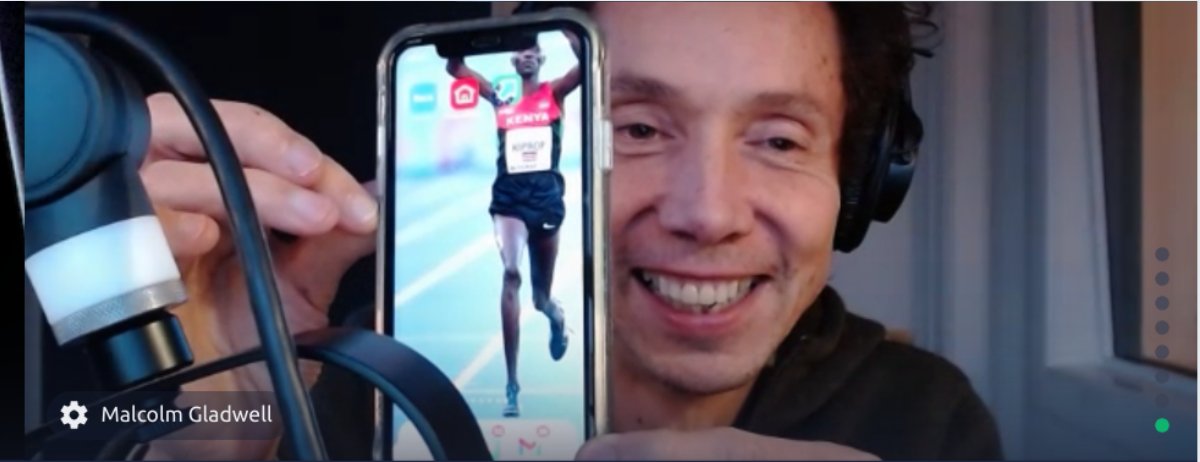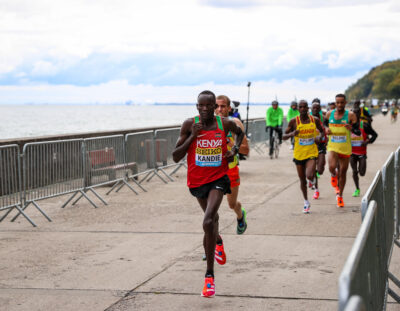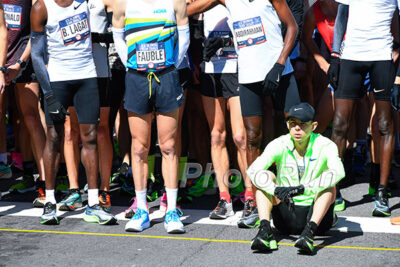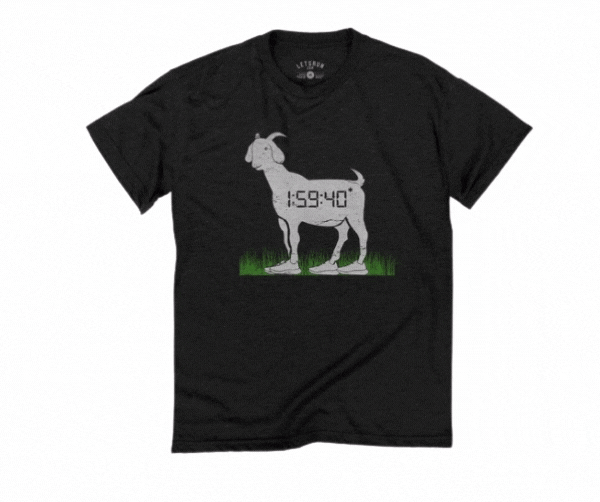Malcolm Gladwell Opens Up on His Love of Running, Saving Track & Field, Nike, Super Shoes, Doping, and More
By LetsRun.com
December 16, 2020
Back in 2013, Malcolm Gladwell said LetsRun.com was his favorite website. Yet somehow, despite producing a weekly podcast for the last two years, we had yet to have the bestselling author and running fanatic on the LetsRun.com Track Talk Podcast.
We decided to remedy that last week, as Gladwell — who also hosts his own popular podcast, Revisionist History — joined Jonathan Gault and LetsRun.com co-founder Weldon Johnson (Wejo) to discuss distance running’s shoe revolution, performance-enhancing drugs, Nike, and how to make the sport of track & field more popular. A fitting variety of topics for a man who’s not shy about tackling big ideas.
Gladwell classifies himself as a “serious mediocre” runner, though he may be selling himself short. Growing up in Canada, he ran 4:05 for 1500 meters at age 14 and got down to 3:55 in college (Editor’s note for non-track fans: those times are equivalent to 4:24 and 4:13 for the mile). More recently, he ran 4:54 at the 2014 Fifth Avenue Mile — at the age of 51.
Gladwell is a Huge Track Fan
Gladwell is also a big fan of the professional side of the sport and is partial to the 5,000 meters (US 5,000m runner Ben True is one of his favorite runners).
“Once, I was having lunch with an exceedingly important person in my life,” Gladwell told LetsRun.com. “Not in the world, but someone I desperately needed to impress in order to get something made and done, and I ducked out after 45 minutes because I wanted to watch a [Diamond League] 5,000 meters. I had my computer, and I was in a hotel, in the restaurant, and I went to basically, back by the men’s bathroom and hid out and watched the 5k…I will take extraordinary steps for track races.” [spp-timestamp time=”6:04″] (click on a timestamp to listen to Gladwell)
As you might expect then, Gladwell was especially happy to learn that the Diamond League — which had planned on dropping the 5,000 from its meets in 2020 — reversed course and reinstated the distance for the 2021 season. Though he is still mystified as to why the DL dropped the 5,000 in the first place.
“What were they smoking? Do we need further evidence of how hopelessly out of touch the power brokers in track and field are than that they would remove [the 5k],” Gladwell said. “If you’re running international track & field, and you think the 5k is expendable, you’re completely out of touch with your customers. It’s nuts.” [spp-timestamp time=”7:20”]
You can listen to the entire 63-minute episode with Gladwell here or in the player below (be sure to rate and review the podcast if you enjoyed it). To subscribe/listen to our podcast click here.
[spp-player track_player url=”https://pinecast.com/listen/9c17739b-ff7a-4b2c-8815-774633529f73.mp3″]
Below, a few highlights from our chat with Malcolm Gladwell.
Become a LetsRun.com insider and join our Supporters Club (SC) for a year and get the LetsRun.com shirt of your choice for the special holiday price of $75. If you’d like exclusive content, access to the LetsRun.com team, an ad-free message board experience, tips from LRC coaching guru John Kellogg, and up to 20% off of shoes at Pacers Running, sign up for the LetsRun.com Supporters Club now.
“I no longer know how much is the shoes, how much is COVID-era PED use, and how much is genuine ability… It is nuts to let this shoe arms race continue.”
We spoke to Gladwell just two days after the insanity of the Valencia Half Marathon, where four men ran under the previous half marathon world record of 58:01, led by Kibiwott Kandie‘s 57:32. Gladwell said that the times were “crazy” and that the rapid advances in shoe technology have made it impossible to properly assess performances.
“These records are nuts,” Gladwell said. “I do get excited, but not when I think there’s some kind of other variables that are screwing up the accomplishment. I no longer know how much is the shoes, how much is COVID-era PED use, and how much is genuine ability.” [spp-timestamp time=”3:55″]
This is even more difficult, Gladwell says, when you consider that certain athletes respond to the super shoes better than others. If one athlete receives a 6% boost in economy from the shoes and another receives a 2% boost — well, that alone could be enough to determine the outcome of the race (Ross Tucker has a brilliant in-depth examination of this topic here).
“Now that I know that [there is individual variation in the response to the shoes] my kind of ambivalence towards these shoes has hardened into flat out antipathy. It is nuts to let this shoe arms race continue.’”
“It just strains credulity,” Gladwell said. “You cannot convince me that those four people are all better than [previous world record holder] Geoffrey Kamworor.”
“At the end of the day, I am not convinced that Nike’s influence on the sport has been positive”
Gladwell made some interesting remarks regarding both Nike, which puts more money into the sport of track and field than any other corporation, and Alberto Salazar, the Nike Oregon Project coach who is trying to get his anti-doping ban overturned.
“At the end of the day, I am not convinced that Nike’s influence on the sport has been positive. I think it was once, I no longer think it is. I think it is distorting the sport and they’re too big for their own good and our own good. And the Oregon-centricity of track field is not healthy for the sport,” said Gladwell. “If you were a Martian and came down to earth, you would think that running was an activity engaged in by people who live in and around Portland, Oregon.” [spp-timestamp time=”19:21”]
Gladwell said he’d prefer Nike dedicate more resources to capturing the hearts and minds of the “serious mediocre runner.”
“You don’t build the sport with Galen Rupps,” Gladwell said of the introverted American distance runner who has captured medals at the last two Olympics.
“The way to build the sport and create a stronger sport is not to coddle a small number of names at the very, very top,” Gladwell said. “It is to solidify the base. Right now, what we have is a very strong and wide base for fun running, for casual running, but not for serious running. The serious mediocre runner, and I count myself as one of them, we are the foundation of the sport. We’re not going to run insane times, but we take running very, very seriously, we care about it. In an ideal world, we would be the ones being cultivated by all this corporate interest. It does not cultivate that serious running base to give Galen Rupp his fourth underwater treadmill or pay $100,000 for some tent that he can sleep in.” [spp-timestamp time=”21:03”]
That said, Gladwell does not want to eliminate elite training groups. He would like to see more details about their training. Gladwell is a fan of Strava for building a sense of community and creating the ability to follow the workouts of pros and training groups. That’s a step some athletes and groups, such as CJ Albertson and HOKA NAZ Elite, have already taken done to cultivate a fanbase. But workout details from groups like the Bowerman Track Club or the now-shuttered Oregon Project were typically hard to come by.
Gladwell was full of praise for upstart apparel brand Tracksmith, which does not sponsor the top end of the sport but did sponsor many of the previously unsponsored runners at this year’s Olympic Marathon Trials. (Gladwell narrates Tracksmith video ads and Tracksmith is an advertiser on Gladwell’s Revisionist History podcast). “My sense is that Tracksmith will prove to be a turning point in a sport where a lot of other brands are going to see the value of affiliating with the sport in some meaningful way,” Gladwell said.
“If I was Nike and going back and redoing the Oregon Project, I would have made the training activities of my athletes transparent,” Gladwell said. “I’d love to know what Galen Rupp [is doing]…If they were to share some of that magic with the serious mediocre running, that’s what builds the sport. Let us participate. Basketball, you get exposure three times a week to your favorite players during the season. The season lasts six months, and you get gossip, updates, trades all year long and you can follow them on Twitter. You are so deep inside your favorite teams that you feel like you’re living your life with them. We have none of that in running.”
As for his views on Rupp’s former coach Alberto Salazar, Gladwell said, “I’m actually a fan of Salazar in the sense that I think he is a brilliant coach and I’m not convinced that all of the bad things said about him are true.” [spp-timestamp time=”20:36″]
“The best way to prevent doping is to make doping sanctions retroactive. You lose EVERYTHING.”
Gladwell’s phone background is a photo of Asbel Kiprop, the 2008 Olympic and 2011, 2013, and 2015 world champion at 1500 meters. This fact begat a discussion about why athletes such as Kiprop, who is currently serving a four-year ban after testing positive for EPO in 2017 (Kiprop continues to vehemently deny doping), are allowed to keep their medals after getting popped for performance-enhancing drugs.
“It dumbfounds me that the sport hasn’t figured out that the best way to prevent doping is to make doping sanctions retroactive,” Gladwell said. “You lose EVERYTHING. We have to assume you were doping your whole career. You cannot play some game and say, ‘Well I started doping two months ago, and so everything else was clean.’ No. You broke the rules and that means you are being banished from the sport. And if at some point, you prove that you were banned incorrectly, we’ll reinstate you.” [spp-timestamp time=”49:32”]
He used the example of Nick Willis as someone whose life would have changed dramatically had dopers been stripped of all their medals. Willis crossed the line third in the 2008 Olympic 1500 final, but was subsequently elevated to silver after original winner Rashid Ramzi tested positive. Kiprop was the second man across the line in that race and was awarded Olympic gold — which would now belong to Willis under Gladwell’s proposal.
“Nick Willis’ life looks nothing like his life now if he’s the gold medalist in the 1500 meters,” Gladwell said. “For one thing, he’d be worth 10 times as much money. He’d be a household name. He’d be up in the pantheon with John Walker of New Zealand distance runners and on and on down the list. And he’s not. Why? Because this sport doesn’t know how to police itself. It just drives me crazy. It really does.”
For more on the Malcolm’s talk subscribe to the LetsRun.com Track Talk Podcast here or on your favorite podcast app.
More Gladwell: Malcolm Gladwell Jokes About LeBron James Mile Showdown: “He’s Ducking Me”
Thoughts? Discuss Gladwell’s appearance on the LetsRun.com Track Talk podcast in our forum.




